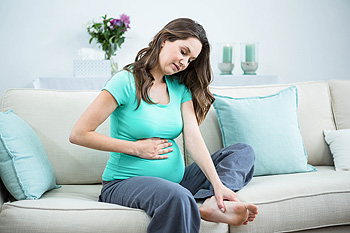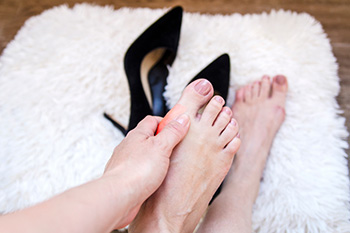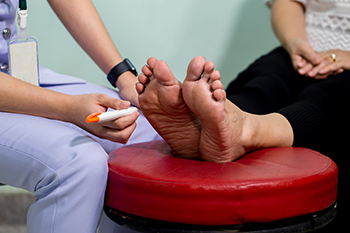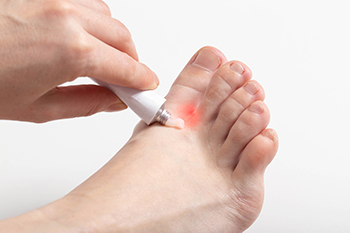
Drexel Hill (484) 521-0233
West Chester (610) 436-5883

Drexel Hill (484) 521-0233
West Chester (610) 436-5883

More than half of pregnant women experience some type of foot problem. Common ailments can include collapsed arches, swelling, cracked heels, and foot pain. Fallen arches are largely due to a weight gain and the release of a hormone called relaxin. This hormone, which relaxes the ligaments in the feet and ankles as well as other body parts, contributes to the appearance of flat feet. A common complaint during pregnancy is swollen feet, which is the result of a buildup of fluid in the lower extremities. Pregnant women are cautioned not to stand for long periods of time, and to keep their feet elevated as often as possible. Heel pain caused by an inflammation of the plantar fascia can be treated by wearing shoes that have more arch support and ample cushioning. Certain exercises can also help to reduce the symptoms. Hormonal changes during pregnancy can cause the skin to dry out, and as it becomes more difficult to reach the feet to keep them properly moisturized, cracked heels may develop. These can become painful and lead to infection if ignored. If you are experiencing any foot problems during pregnancy, it is suggested that you make an appointment with a podiatrist.
Pregnant women with swollen feet can be treated with a variety of different methods that are readily available. For more information about other cures for swollen feet during pregnancy, consult with the podiatrists from Dr. Siegerman & Associates. Our doctors will attend to all of your foot and ankle needs.
What Foot Problems Can Arise During Pregnancy?
One problem that can occur is overpronation, which occurs when the arch of the foot flattens and tends to roll inward. This can cause pain and discomfort in your heels while you’re walking or even just standing up, trying to support your baby.
Another problem is edema, or swelling in the extremities. This often affects the feet during pregnancy but tends to occur in the later stages.
How Can I Keep My Feet Healthy During Pregnancy?
If you have any questions please feel free to contact one of our offices located in Drexel Hill and West Chester, PA . We offer the newest diagnostic and treatment technologies for all your foot and ankle needs.

Wearing high heels can enhance the look of your legs and ankles, but may not be helping the health of your feet. However, though experts agree that while most bunions form because of a genetic disposition to this deformity, wearing high heels can make the problem worse if you are already susceptible. Also, it is thought that having a bunion is more of a matter of your gait, or how you walk, than the type of shoes you wear. But because wearing high heels forces the weight of the body toward the ball of the foot, they may add to the likelihood of a bunion formation. A bunion is a deformity that pushes the bone outward at the base of the big toe joint causing a lump to develop on the side of the foot. The other toes react by moving in the opposite direction. High heels, which often have a small and pointed toe box, essentially encourage this movement. If you often wear high heels and notice a bunion forming, it is suggested that you make an appointment with a podiatrist who can offer treatment options.
High heels have a history of causing foot and ankle problems. If you have any concerns about your feet or ankles, contact the podiatrists from Dr. Siegerman & Associates. Our doctors can provide the care you need to keep you pain-free and on your feet.
Effects of High Heels on the Feet
High heels are popular shoes among women because of their many styles and societal appeal. Despite this, high heels can still cause many health problems if worn too frequently.
Which Parts of My Body Will Be Affected by High Heels?
What Kinds of Foot Problems Can Develop from Wearing High Heels?
How Can I Still Wear High Heels and Maintain Foot Health?
If you want to wear high heeled shoes, make sure that you are not wearing them every day, as this will help prevent long term physical problems. Try wearing thicker heels as opposed to stilettos to distribute weight more evenly across the feet. Always make sure you are wearing the proper shoes for the right occasion, such as sneakers for exercising. If you walk to work, try carrying your heels with you and changing into them once you arrive at work. Adding inserts to your heels can help cushion your feet and absorb shock. Full foot inserts or metatarsal pads are available.
If you have any questions please feel free to contact one of our offices located in Drexel Hill and West Chester, PA . We offer the newest diagnostic and treatment technologies for all your foot and ankle needs.

Neuropathy affects the nerves throughout the body, including the feet, and it can cause the inability to feel pain in the soles of the feet. Many people who have this condition are unable to feel if their feet are hot or cold, and they may have a consistent tingling or numbing sensation. People who are diabetic can develop neuropathy which can lead to serious consequences as wounds can develop on the bottom of the feet that are not noticed. Untreated wounds in these patients may lead to getting foot ulcers, and it is imperative the bottom of the feet are checked daily. Patients who are afflicted with neuropathy may have difficulty walking, balance may be affected, and it may possibly lead to falling. If you have this condition, it is strongly suggested that you are under the care of a podiatrist who can guide you toward proper management techniques.
Neuropathy
Neuropathy can be a potentially serious condition, especially if it is left undiagnosed. If you have any concerns that you may be experiencing nerve loss in your feet, consult with the podiatrists from Dr. Siegerman & Associates. Our doctors will assess your condition and provide you with quality foot and ankle treatment for neuropathy.
What Is Neuropathy?
Neuropathy is a condition that leads to damage to the nerves in the body. Peripheral neuropathy, or neuropathy that affects your peripheral nervous system, usually occurs in the feet. Neuropathy can be triggered by a number of different causes. Such causes include diabetes, infections, cancers, disorders, and toxic substances.
Symptoms of Neuropathy Include:
Those with diabetes are at serious risk due to being unable to feel an ulcer on their feet. Diabetics usually also suffer from poor blood circulation. This can lead to the wound not healing, infections occurring, and the limb may have to be amputated.
Treatment
To treat neuropathy in the foot, podiatrists will first diagnose the cause of the neuropathy. Figuring out the underlying cause of the neuropathy will allow the podiatrist to prescribe the best treatment, whether it be caused by diabetes, toxic substance exposure, infection, etc. If the nerve has not died, then it’s possible that sensation may be able to return to the foot.
Pain medication may be issued for pain. Electrical nerve stimulation can be used to stimulate nerves. If the neuropathy is caused from pressure on the nerves, then surgery may be necessary.
If you have any questions, please feel free to contact one of our offices located in Drexel Hill and West Chester, PA . We offer the newest diagnostic and treatment technologies for all your foot care needs.

Athlete’s foot, also known as tinea pedis, is a fungal infection that results in inflammation, redness, itchiness, and scaling between the toes. It can also cause blistering on the bottom of the feet. This is a highly contagious infection and can be brought on by wearing wet or sweaty shoes or by walking barefoot on contaminated wet floors. Common areas to pick up athlete’s foot are pools, locker rooms, and public showers. Athlete’s foot can be difficult to cure and may come back again or turn into a bacterial infection if left untreated. There is more than one type of athlete’s foot. The three types of this fungal infection are interdigital, moccasin, and vestibular infections. An interdigital infection affects the skin between the toes. A moccasin infection covers the sole of the foot and can spread to the heel and edges of the feet. A vestibular infection can appear between the toes or the soles of the feet and can cause blisters or vesicles filled with pus that can burst open and cause open sores. Because athlete’s foot can sometimes be misdiagnosed, it is suggested that if you have these types of symptoms, an appointment is made with a podiatrist who can accurately diagnose and offer treatment options for athlete’s foot.
Athlete’s foot is an inconvenient condition that can be easily reduced with the proper treatment. If you have any concerns about your feet and ankles, contact the podiatrists from Dr. Siegerman & Associates. Our doctors will treat your foot and ankle needs.
Athlete’s Foot: The Sole Story
Athlete's foot, also known as tinea pedis, can be an extremely contagious foot infection. It is commonly contracted in public changing areas and bathrooms, dormitory style living quarters, around locker rooms and public swimming pools, or anywhere your feet often come into contact with other people.
Solutions to Combat Athlete’s Foot
Athlete’s foot can cause many irritating symptoms such as dry and flaking skin, itching, and redness. Some more severe symptoms can include bleeding and cracked skin, intense itching and burning, and even pain when walking. In the worst cases, Athlete’s foot can cause blistering as well. Speak to your podiatrist for a better understanding of the different causes of Athlete’s foot, as well as help in determining which treatment options are best for you.
If you have any questions please feel free to contact one of our offices located in Drexel Hill and West Chester, PA . We offer the newest diagnostic and treatment technologies for all your foot and ankle needs.
Request a free copy of
Laser Away Foot Pain!
today.
